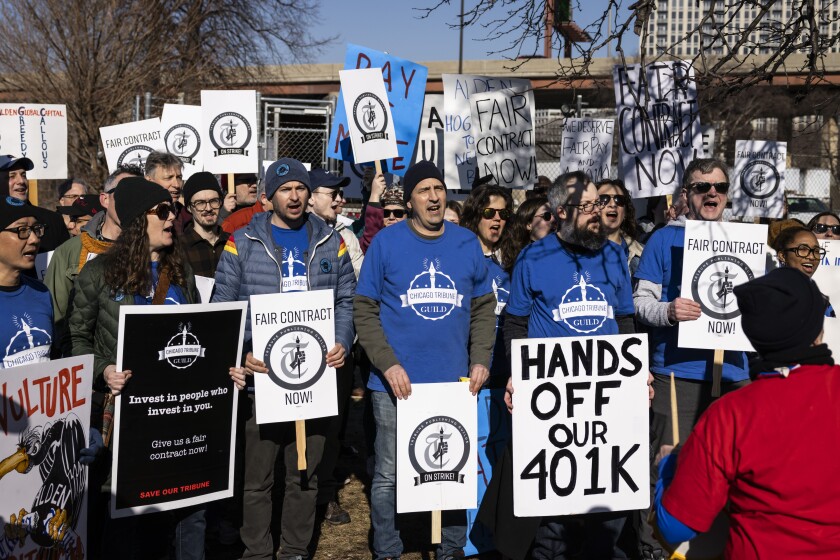Seven Chicago Tribune journalists filed a class-action lawsuit Thursday against the newspaper and its owner, alleging violations of equal pay based on sexual and racial discrimination.
The lawsuit alleges systematic pay disparities between female and male employees, as well as between Black and white employees, under its current ownership of Alden Global Capital and dating back to its previous owner, the Tribune Publishing Co.
“This is, in part, about protecting journalism,” Michael Morrison of Alexander Morrison + Fehr, a California-based law firm that jointly filed the lawsuit in federal court with Chicago-based KJC Law Group, told the Sun-Times.
“What we want to make sure is that journalists of color and women get paid fairly for similar experience that they have, and similar backgrounds, for their skill that they’ve actually demonstrated in this position,” Morrison said.
Chicago Tribune, Alden Global Capital and Tribune Publishing Co. are listed as defendants in the suit. They could not be immediately reached for comment.

Reporter Joe Mahr (center, in black hat) pickets on Feb. 1 with other Chicago Tribune newsroom employees and their supporters outside the Chicago Tribune Freedom Center in West Town during a 24-hour strike to demand fair wages and continuation of their 401(k) match benefits.
Ashlee Rezin/Sun-Times file
Named plaintiffs are Madeline Buckley, a criminal justice reporter; Terrence James, a photojournalist; Stacey Wescott, a visual journalist; Colleen Kujawa, an editor; Deanese Williams, a senior deputy content editor; Darcel Rockett, a features reporter; and Christy Gutowski, a criminal justice reporter.
The seven journalists are representing more than 50 other women and Black employees of the newspaper. The lawsuit seeks back pay for the disparities in wages, along with a restructuring of the Tribune’s compensation policies and practices.
“One thing remains consistent across each section of the Chicago Tribune’s news operation — women and African American employees are underpaid by several thousands of dollars a year compared to their male and white counterparts,” the lawsuit states. “No legitimate factors account for the enormous, statistically significant pay gap that the Tribune has created and intentionally maintains.”
The newspaper also used diversity recruitment programs to hire women and minority journalists into temporary yearlong positions at salaries “significantly less than their colleagues who performed the same work,” the lawsuit claimed.
Williams, a Black woman, has received three raises since she was hired by the Tribune in 2007 through one of the diversity recruitment programs, according to the lawsuit. Her work has contributed to multiple Illinois Press Association and other awards, and she has been honored by the Tribune for her “outstanding professional performance.”
Williams has been promoted several times throughout her tenure, most recently to deputy senior content editor in 2023, but is the second-lowest paid employee with that title, the lawsuit alleges. A 24-year-old early career editor is the only editor who earns less money than Williams, making $2,000 less than she does, the lawsuit states.
James, who is the Tribune’s only Black photojournalist, has earned one “significant” pay raise in his 31 years working at the Tribune, and earns less money than non-African American employees who perform similar work, the lawsuit says.
Tribune employees have in the past raised concerns about unequal pay for minority journalists to its former and current owners, the lawsuit states.
The lawsuit also claims the Tribune has “intentionally” hired minority journalists for positions at its six daily suburban publications, which pay less than the Chicago newspaper.
“The concern I have is, if journalism is not in a fair place in terms of pay equity for women and minorities, then these people will not go into that profession. We might lose those important voices, precisely at a time where we need to hear these voices, where these voices can be drowned out,” Morrison said. “This is about fairness; it’s not about asking for extra money or just getting a raise, because everybody needs more money.”
Tribune journalists also earlier this year went on 24-hour strike, joining hundreds of other Tribune Publishing employees in a nationwide action to demand management pay fair wages and not eliminate their 401(k) match benefits.





